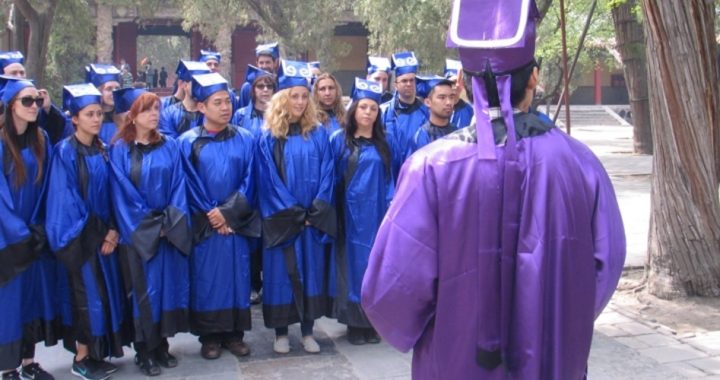
It’s a simple formula: Take Chinese money — then put Chinese propaganda in the classroom. More than 500 colleges worldwide, more than 100 in the United States, and approximately 400 K–12 schools have already bitten this apple, doing the bidding of the Chinese government. It’s just another example of the little-known Beijing effort to become the world’s dominant power.
This effort can appear quite innocent, though. Effected via the “Confucius Institute” — which is overseen by a Chinese Ministry of Education entity known as “Hanban” — the ostensible goal is to teach Chinese language, culture, and history. As Nancy Gutierrez, UNC Charlotte’s dean of the College of Liberal Arts and Sciences, explained about why her institution opened a Confucius Institute branch last year, it will “help students be better equipped to succeed in an increasingly globalized world” and “broaden the University’s outreach and support for language instruction and cultural opportunities in the Charlotte community.” Yet as Politico reports:
But the Confucius Institutes’ goals are a little less wholesome and edifying than they sound — and this is by the Chinese government’s own account. A 2011 speech by a standing member of the Politburo in Beijing laid out the case: “The Confucius Institute is an appealing brand for expanding our culture abroad,” Li Changchun said. “It has made an important contribution toward improving our soft power. The ‘Confucius’ brand has a natural attractiveness. Using the excuse of teaching Chinese language, everything looks reasonable and logical.”
Politico informs that the Confucius Institute initiative is part of a broader propaganda campaign to which the Chinese government devotes $10 billion yearly. What this money pays for is the teaching of “a very particular, Beijing-approved version of Chinese culture and history: one that ignores concerns over human rights, for example, and teaches that Taiwan and Tibet indisputably belong to Mainland China. Take it from the aforementioned Li, who also said in 2009 that Confucius Institutes are an ‘important part of China’s overseas propaganda set-up.’ Critics also charge that the centers have led to a climate of self-censorship on campuses that play host to them,” writes Politico.
That may be an understatement, however. As I wrote in 2015:
[T]his red carpet rolled out for Red Chinese propagandists is much as if the Cold War United States had invited Soviet agents to openly teach in American schools. (While such individuals were causing mischief on our shores, they found it necessary in their more traditional time to masquerade as something they weren’t.)
But much as with the self-avowed communists who can now openly work in our government — such as Barack Obama’s ex-green-jobs “czar” Van Jones — the mask is off. …Writes the [Chicago] Tribune, “Critics … say that [Confucius Institute] classes avoid controversial subjects such as the Tiananmen Square massacre and Falun Gong, a religious sect outlawed in China. Some schools that host the programs have canceled visits from the Dalai Lama under pressure from Beijing.” [Campus Reform’s Kaitlyn] Schallhorn adds, “‘[China’s] government is intent on portraying a version of itself that is harmonious and happy,’ [Heritage Foundation’s Mike] Gonzalez told Campus Reform. ‘None of the bad things that happen in China, in the PRC, [that] are because of its government are ever portrayed.’”
Moreover as Gonzalez pointed out in his own 2015 report:
• “Hanban/Confucius Institutes misrepresent themselves when they stress the link to the PRC’s Education Ministry. Hanban reports directly to political apparatchiks in the Politburo, not to educators in the Ministry (who are, as likely as not, members of the Chinese Communist Party in any case).”
• “The agreements between universities and Hanban that establish the Confucius Institutes include nondisclosure clauses that make the entire enterprise opaque.”
• “The Confucius Institutes have been set up as bases of industrial espionage and to pursue Chinese students and other Chinese nationals who stray from the party line here in the United States.”
• “By adhering to Chinese law and barring the hiring of people whose activities are illegal in China — for example, adherents of the Falun Gong religion — the Confucius Institutes break U.S. labor and employment laws.”
In fact, Gonzalez warns that the Confucius Institutes could pose a threat to U.S. national security. Schallhorn quotes him as saying, “I can tell you that anybody from any communist government, I don’t care which communist government — Cuba, North Korea, Vietnam, China — that is overseas is going to be asked by the government to come conduct espionage activity.” Schallhorn also reports that Steven Mosher, a social scientist and expert on China, warned that the “Institutes employ ‘a number of individuals’ who ‘have backgrounds in Chinese security agencies.’”
Mind you, China couples this infiltration of academia with that of another culture-shaping entity: entertainment. Through Beijing’s powerful State Administration of Radio, Film and Television (S.A.R.F.T), the regime uses an economic carrot-and-stick approach to try to ensure that our movies present a sanitized version of China. As an example, while the invaders in the 2012 version of the film Red Dawn were originally portrayed as Chinese, MGM studios digitally altered the movie in 2011 to make them appear North Korean — in response to Chinese pressure.
To punctuate this portrait of growing Chinese influence, news now is that European banks are starting to replace dollar reserves with the Yuan. But this is fitting, given that Chinese money is already buying a place in academia and entertainment.
Joseph Stalin once said, “When we hang the capitalists, they will sell us the rope we use.” Would he have ever guessed that the hangmen might be Chinese?
Photo shows students from a Confucius Institute in U.S. visiting Confucius Temple in China: Imaginechina via AP Images



